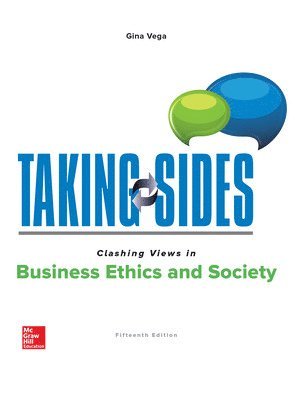
Fler böcker inom
- Format
- Häftad (Paperback)
- Språk
- Engelska
- Antal sidor
- 288
- Utgivningsdatum
- 2017-10-25
- Upplaga
- 15
- Förlag
- McGraw-Hill Education
- Dimensioner
- 272 x 213 x 10 mm
- Vikt
- Antal komponenter
- 1
- ISBN
- 9781259922800
- 590 g
Taking Sides: Clashing Views in Business Ethics and Society
Häftad,
Engelska, 2017-10-25
Slutsåld
Kundrecensioner
Har du läst boken?
Sätt ditt betyg »
Fler böcker av Gina Vega
-
Entrepreneurial Finance
Miranda S Lam, Gina Vega, Miranda S Lam, Gina Vega
-
Moral Courage in Organizations
Debra R Comer, Gina Vega
-
Case Writing Workbook
Gina Vega
Innehållsförteckning
unit 1: capitalism and the corporation
issue: is increasing profits the only social responsibility of business?
yes: milton friedman, from The Social Responsibility of Business Is to Increase Its Profits, the new york times magazine (1970)
no: joseph hart, from The New Capitalists, utne reader (2006)
Milton Friedman argues that businesses have neither the right nor the ability to make social responsibility a priority. Profit making must be the priority. Businesses serve employees and customers best when they do their work with maximum efficiency. The only restrictions on the pursuit of profit that Friedman accepts are the requirements of law and the "rule of the game" ("open and free competition without deception or fraud"). Joseph Hart disagrees. He states, "It's no longer enough more and more corporations are conceding, for capitalism to simply make money. It must also make a difference." Using logic developed by Alan Greenspan, Hart averts that business must make room for values other than self-interest.
issue: can ethics codes build true corporate ethics?
yes: eric krell, from How to Conduct an Ethics Audit: An Ethics Audit Can Reveal Gaps in Your Ethics Policies and Practices, hr magazine (2010)
no: greg young and david s. hasler, from Managing Reputational Risks: Using Risk Management for Business Ethics and Reputational Capital, strategic finance (2010)
Eric Krell finds that one of the major corporate goals of the human resource office is to build true corporate ethics. He believes this can be done with a code of ethics, through performance reviews, and with ethics audits. Through this process, employees' good and corporate good can become the same. Greg Young and David S. Hasler believe that strengthening the role of ethical and reputational capital has been given the short shrift within corporations. It may be that one day ethics audits and ethics codes could be essential in building capital. However, they state that until management understands that poor ethics make for poor profits, business practices will continue to ignore the place of an ethics core within their organization.
issue: have the antitrust laws outlived their effectiveness vis--vis technology?
yes: craig timberg, from FTC: Google Did Not Break Antitrust Law with Search Practices, the washington post (2013)
no: marvin ammori, from The Case for Net Neutrality, foreign affairs (2014)
Craig Timberg claims that "The murky standards for establishing consumer harm" have gotten in the way of more serious charges of business practices that hurt compet...
Du kanske gillar
-
Peak Human
Johan Norberg
Inbunden -
Peak Human
Johan Norberg
Häftad -
Quicksilver
Callie Hart
Häftad -
The Devils
Joe Abercrombie
Häftad
